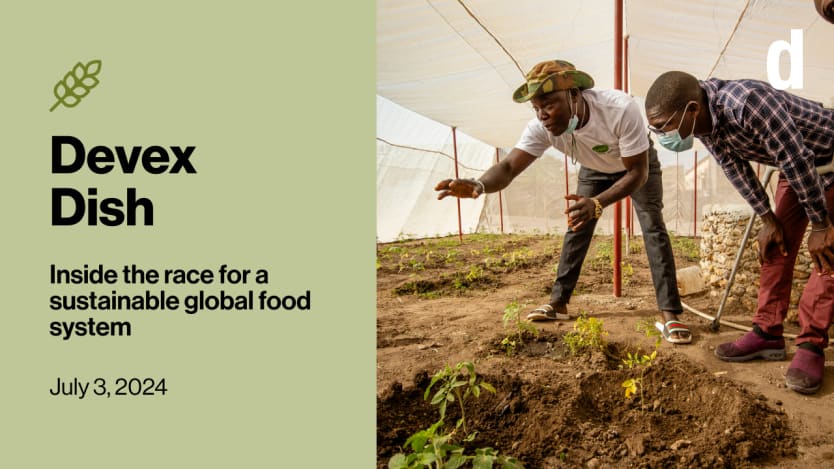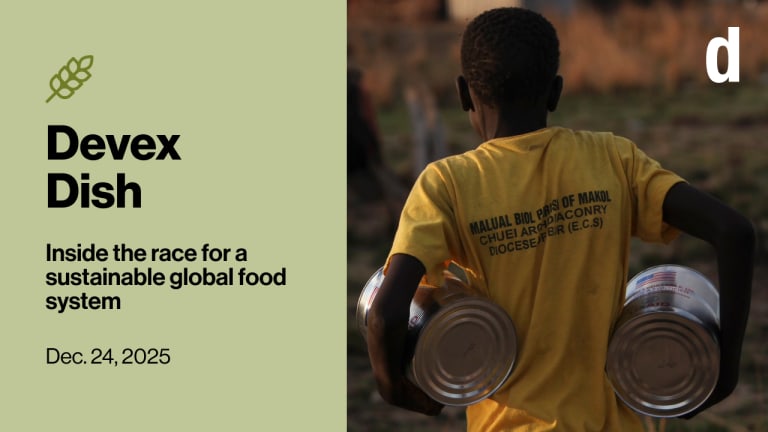Presented by Heifer International

We’re at the dawn of an agroecological revolution, if the Agroecology Coalition has its way.
The coalition has launched a new strategy to address the interlinked crises that we write about so often here at Dish: A food system that is not sustainably able to meet global hunger needs, while also producing outsized greenhouse gas emissions.
The coalition emerged in 2021 on the sidelines of the inaugural United Nations Food Systems Summit, and its membership has exploded to nearly 300 — including governments, U.N. agencies, philanthropic foundations, and civil society groups. They believe agroecology can help usher in a food system that is “sustainable, resilient, inclusive, equitable, healthy and flourish[es] economically.”
In case you’re still wondering what agroecology is: In plain terms, it’s concerned with balancing the relationships between plants, animals, people, and the environment within the framework of farming. It’s more than just soil and crops, but a consideration of how farming affects and reflects sociopolitical issues, such as human rights and climate.
Or, as the coalition explains, it means upending a mindset that views nature and food primarily as commodities rather than recognizing the broader ways in which they integrate with society.
This is a preview of Devex Dish
Sign up to this weekly newsletter to get the inside track on how agriculture, nutrition, sustainability, and more are intersecting to remake the global food system.
To translate that vision into action, the coalition strategy aims to:
• Work through regional, national, and local governments, as well as with international agencies, to introduce policies and regulations to accelerate transformation of food systems through agroecology.
• Look to the private sector for increased investments in agroecological practices.
• Support the rights and knowledge of farmers and other food producers to build a more equitable and resilient food system.
• Strengthen the existing food system participants: family farmers, fishers, pastoralists, Indigenous people, and others.
The coalition is meant to be a resource for its members’ advocacy in any institution or forum where food systems may be under discussion, the coalition’s coordinator, Oliver Oliveros, tells Dish Editor Tania Karas.
“The bigger picture is food system transformation. The pathway is agroecology,” Oliveros says.
And with all of the “Rio conventions” — a trio of U.N. conventions on climate change, desertification, and biodiversity loss — holding summits later this year, there will be lots of opportunities for the coalition to push agroecology forward.
Read: 300 groups launch strategy to transform food systems through agroecology
Related op-ed: Donor support boosts agroecological fixes to food, climate crises
A radish-cal solution
Are vegetable gardens the answer to the global gap in eldercare? Thailand’s “Condom King” thinks so.
Let’s step back for a second. Like many low- and middle-income countries, Thailand has a rapidly aging population that is set to receive little support from the state. The World Health Organization estimates that by 2050, the number of people over 60 years old will double to 2.1 billion, with 80% living in LMICs.
Mechai Viravaidya, a longtime poverty reduction and family planning advocate, which is why he is affectionately known as the Condom King, wants to change how those communities are perceived.
Instead of looking at them only as recipients, he wants to start allotments around the country’s more than 40,000 temples, which would allow older people to grow produce. There are obvious benefits, including income generation that can help with housing and care, if needed. It also offers easy access to regular health checks.
But at Dish, we’re also keen on the idea of more affordable, healthy vegetables becoming accessible to consumers and growers. And as Viravaidya tells Devex contributing reporter Rebecca Root, farming was an obvious starting point for this kind of initiative, since “you can produce a great volume with little space.”
So far the project is in a pilot stage at three temples in the country’s Buriram province. But Viravaidya says that officials from other temples have already come to check out the progress at the sites and he suspects new allotments should be cropping up shortly.
Read: Why this activist is piloting the ‘elderly country club’ in Thai temples
+ Devex Pro members can read about the World Bank’s ambitious commitment to help LMICs provide 1.5 billion people with quality health care throughout their lives by 2030.
Not a Devex Pro member yet? For a limited time, we’re offering $100 off on an annual Pro membership. Sign up today. You’ll also get access to Devex Pro Week, happening from July 22-26 and featuring exclusive, in-depth events and analysis on the key forces shaping global development.
Sudan on the brink
Fifteen months into its ongoing civil war, Sudan continues its horrific slide toward famine.
At least 755,000 people face “catastrophic” levels of acute food insecurity: They’re unable to meet their basic needs and are at risk of starvation and death, according to a report last week by the Integrated Food Security Phase Classification. And over half of the country’s population of 49 million are not consuming enough food and face a high risk of malnutrition, creating “the worst levels of acute food insecurity” IPC has ever recorded in the country. There is a risk of famine in 14 areas.
With the lean season coming, things are likely only going to get worse, if that’s even possible to imagine. The figures for Sudan are worse than those that IPC issued last week for Gaza. Last month, USAID Administrator Samantha Power called Sudan “the single largest humanitarian crisis on the planet.”
Aside from the obvious, which would be an end to the current conflict, IPC is looking for sustained, safe humanitarian access and the delivery of emergency food assistance to areas that are on the brink of collapse.
Related op-ed: Aid competes with long-term solutions to Sudan’s hunger crisis
Not so fast
Bringing home the bacon
Your next job?
Food Systems Resilience Scientist
The Nature Conservancy
United States
We had promised we’d be coming to you from Nairobi, Kenya, this week, where CGIAR was set to host its inaugural Science Week. Unfortunately, the gathering — for which more than 3,000 people were registered to attend in person — was postponed at the last minute amid violent political demonstrations against an unpopular Kenyan tax bill.
We were primed for the event, which promised interesting conversations on how to leverage science to build more sustainable food, land, and water systems, but we’ll have to wait until it can be rescheduled. We’re still waiting for word on when that will be.
A CGIAR spokesperson tells Tania, who was set to attend along with Devex contributing reporter David Njagi, that they are hoping “for a peaceful resolution to the current situation,” with more details to follow.
Chew on this
A major commodities trader warns the world is headed for “food wars” as geopolitical tensions and climate change push countries into conflict over waning supplies. [Financial Times]
The resident director of the World Food Programme’s southern Africa bureau has abruptly resigned amid allegations of corruption in a Rapid Rural Transformation project. [Pass Blue]
In a bid to safeguard the rights of farmers, China has passed a law giving them more control over the collectives that exercise land lease rights on their behalf. [Reuters]
On her global tour, music superstar Taylor Swift regularly contributes to local food banks, including giving enough money to a U.K. food bank to deliver a year’s worth of meals in one community. [Newsweek Opinion]








